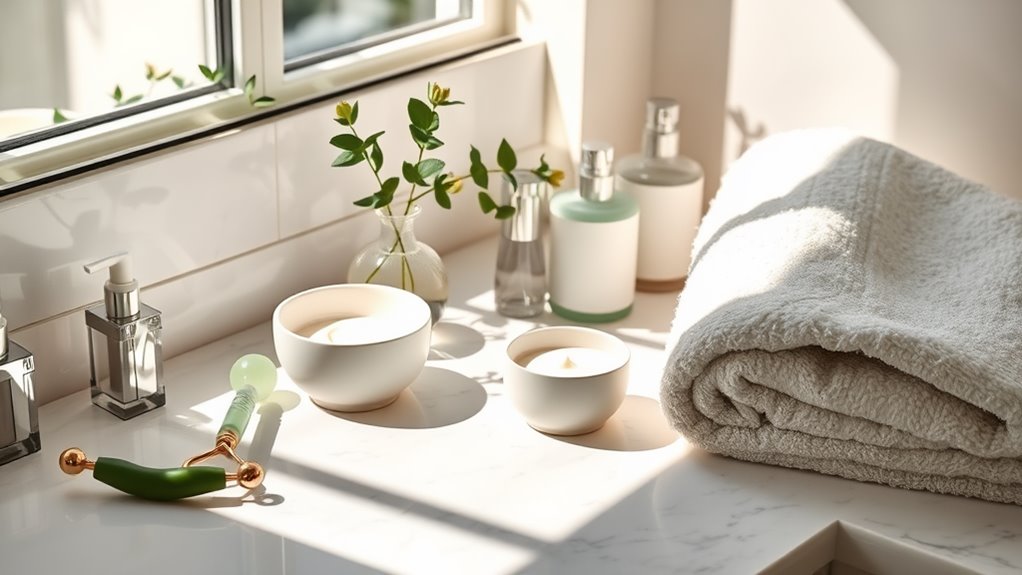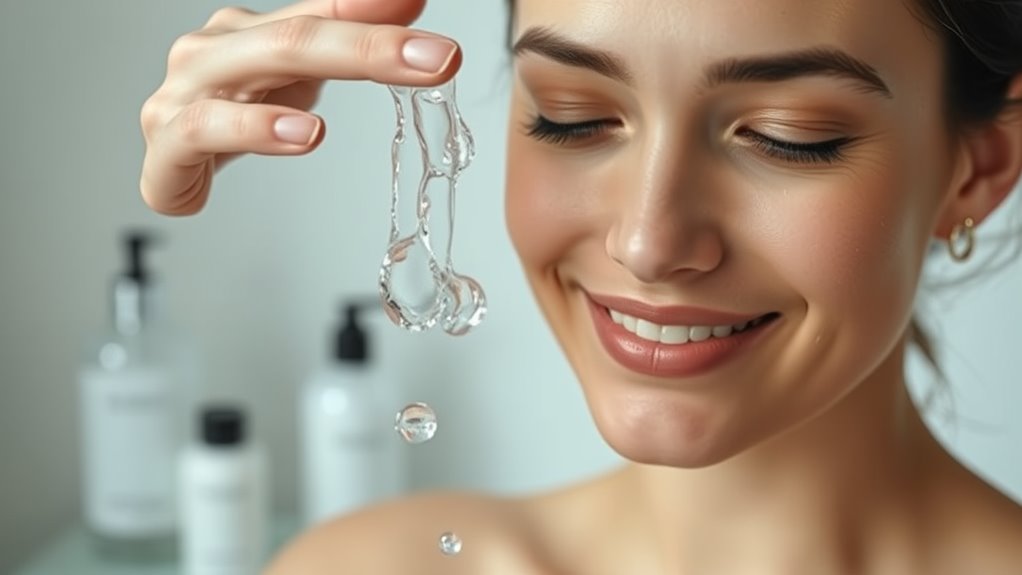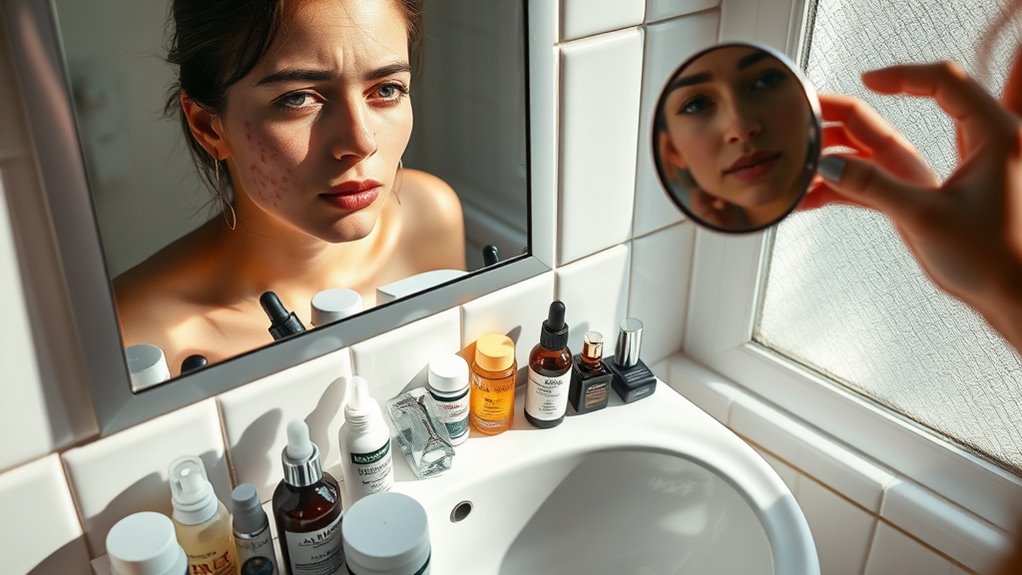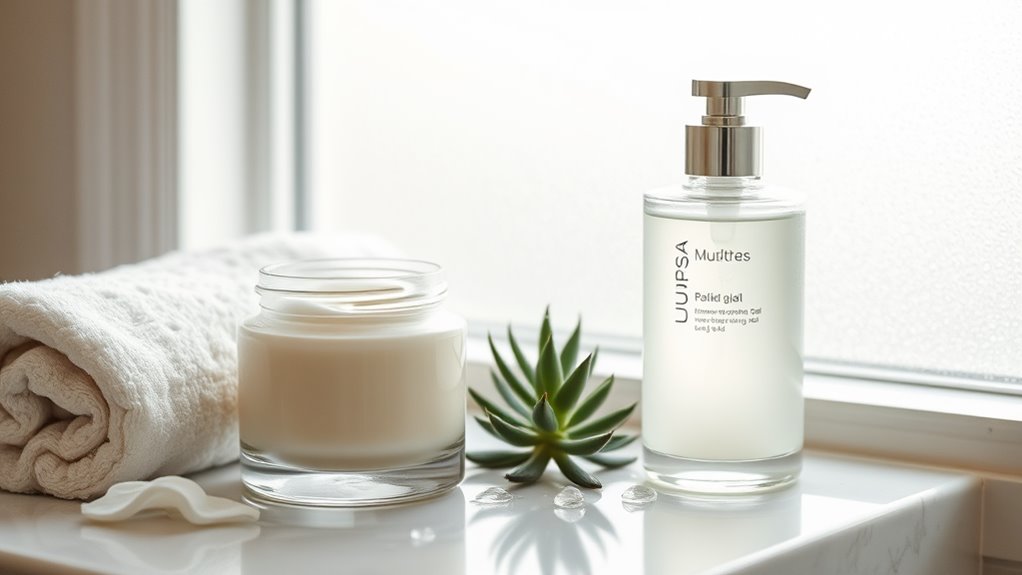Morning Skincare Routine That Keeps Skin Glowing All Day
To keep your skin glowing all day, start with a gentle cleanser to remove impurities, followed by a toner to balance your skin’s pH. Exfoliate 2-3 times a week to reveal radiance and apply targeted serums for specific concerns. Always moisturize to lock in hydration and finish with a broad-spectrum sunscreen. Consistency in this morning routine helps maintain a long-lasting glow. Want to learn the best products for each step? Keep exploring!
Key Takeaways
- Start with a gentle cleanser to remove impurities and maintain skin’s natural barrier for a fresh complexion.
- Use a toner suited to your skin type to restore pH balance and enhance hydration.
- Exfoliate 2-3 times a week to reveal smoother skin and improve radiance.
- Apply a serum targeting specific concerns, like vitamin C for brightness or hyaluronic acid for hydration.
- Finish with a lightweight moisturizer and broad-spectrum sunscreen to lock in moisture and protect against UV damage.
Cleansing: The First Step to Fresh Skin
Cleansing is the foundation of any effective morning skincare routine. You need to start by removing impurities that accumulate overnight, ensuring your skin’s ready to absorb the beneficial products you’ll apply next.
Choose a cleanser that matches your skin type; whether it’s gel, cream, or foam, the right formula will enhance your fresh start. As you wash your face, use gentle circular motions to stimulate circulation, invigorating your skin.
Don’t rush this step—take a moment to enjoy the process, as it’s essential for your overall routine. Rinse thoroughly with lukewarm water to maintain hydration, then pat your skin dry. Additionally, using a cleanser that contains an appropriate pH balance can help preserve your skin’s natural barrier.
Exfoliation: Buffing Away Dead Skin Cells
While cleansing sets the stage, exfoliation takes your morning skincare routine to the next level by buffing away dead skin cells.
This essential step reveals smoother, more radiant skin, allowing your products to penetrate deeply. To master your exfoliation technique, consider these key points:
-
Choose the Right Exfoliant: Opt for chemical or physical exfoliants based on your skin type and sensitivity.
-
Frequency Matters: Exfoliate 2-3 times a week to avoid over-exfoliation, which can irritate your skin.
-
Gentle Application: Use light pressure in circular motions to avoid damaging your skin barrier.
-
Follow Up: Always apply moisturizer afterward to hydrate and lock in that newfound glow.
Incorporate exfoliation, and watch your skin transform! Additionally, maintaining a consistent routine helps to ensure that your skin benefits from the exfoliation process over time.
Toning: Balancing Your Skin’s Ph
Toning helps restore your skin’s natural pH after cleansing, which is essential for ideal function. A well-formulated toner can tighten pores, enhance hydration, and prepare your skin for subsequent products. Choosing the right toner also depends on identifying your skin type to ensure optimal effectiveness.
Choose a toner that suits your skin type; for oily skin, look for ingredients like witch hazel, while dry skin benefits from rose water or glycerin. Apply the toner with a cotton pad or simply pat it on with your hands to maximize absorption. This process not only refreshes your complexion but also primes your skin to better absorb serums and moisturizers, ensuring you maintain that radiant glow throughout the day.
Serums: Targeting Specific Skin Concerns
How can you effectively address your skin concerns? Incorporating serums into your routine is key.
These concentrated treatments deliver powerful ingredients directly to your skin, targeting specific issues. Here’s how to choose the right serum for your needs:
-
Vitamin C: Brightens skin and combats dullness.
-
Hyaluronic Acid: Provides intense hydration and plumps skin.
-
Retinol: Reduces fine lines and boosts cell turnover.
-
Niacinamide: Minimizes pores and improves skin texture.
In addition to these benefits, using Vitamin C in skincare can enhance your skin’s overall radiance and protection against environmental damage.
Moisturizing: Locking in Hydration
To maintain a healthy glow, moisturizing is essential after applying your serums. A well-chosen moisturizer not only locks in the benefits of your serums but also creates a protective barrier against environmental stressors.
Look for products rich in hyaluronic acid, glycerin, or ceramides, as these ingredients effectively hydrate and plump your skin. Apply your moisturizer while your skin is still slightly damp from the serums to maximize absorption.
Don’t forget to tailor your moisturizer to your skin type—lightweight gels for oily skin and richer creams for dry skin. Massage it in using upward strokes to boost circulation and enhance absorption. Additionally, incorporating natural oils into your routine can provide extra nourishment and help combat signs of aging.
With this step, you’ll guarantee your skin remains hydrated and radiant throughout the day.
Sunscreen: Protecting Your Skin From UV Damage
Now that you’ve locked in hydration, it’s time to focus on sunscreen.
Daily protection from UV damage is essential for maintaining healthy skin, so you need to choose the right type for your needs.
Let’s explore the options and tips for effective application.
Importance of Daily Protection
Although many people underestimate the importance of sunscreen, it plays an essential role in protecting your skin from harmful UV damage. Daily application is imperative for maintaining healthy, glowing skin.
Here’s why you shouldn’t skip this fundamental step:
-
Prevents Premature Aging: Sunscreen helps reduce fine lines and wrinkles caused by sun exposure.
-
Reduces Skin Cancer Risk: Regular use considerably lowers the chances of developing skin cancer.
-
Maintains Even Skin Tone: It prevents dark spots and discoloration, ensuring a uniform complexion.
-
Enhances Overall Skin Health: Sunscreen acts as a barrier against harmful pollutants and environmental stressors.
Incorporating sunscreen into your daily routine is non-negotiable for achieving and preserving radiant skin.
Make it a habit, and your skin will thank you!
Types of Sunscreens Available
When choosing a sunscreen, you’ll find three main types: chemical, physical (or mineral), and hybrid formulas.
Chemical sunscreens absorb UV rays through their active ingredients, like avobenzone and octisalate, providing a lightweight feel. They often blend seamlessly into the skin, making them popular for daily use.
Physical sunscreens, containing zinc oxide or titanium dioxide, create a barrier that reflects UV rays. They’re ideal for sensitive skin and provide immediate protection upon application.
Hybrid formulas combine both types, offering broad-spectrum protection while catering to various skin preferences.
Application Tips for Effectiveness
Choosing the right sunscreen is just the first step; proper application is key to maximizing its effectiveness.
To guarantee your skin stays protected from UV damage, follow these tips:
-
Apply generously: Use about a nickel-sized amount for your face and a shot glass for your body. Don’t skimp!
-
Timing matters: Apply sunscreen 15-30 minutes before sun exposure to allow it to absorb fully.
-
Reapply regularly: Every two hours, or immediately after swimming or sweating, is essential to maintain protection.
-
Don’t forget areas: Cover overlooked spots like ears, neck, and the tops of your feet to ensure thorough protection.
Master these techniques, and you’ll keep your skin glowing and safeguarded all day.
Extra Treatments: Adding a Boost With Face Masks or Oils
Incorporating extra treatments like face masks and oils can elevate your morning skincare routine, providing that much-needed boost for your skin.
Face masks, whether hydrating, purifying, or brightening, deliver concentrated ingredients that target specific concerns. Choose a mask that aligns with your skin’s needs and apply it after cleansing for maximum effect.
Oils, on the other hand, can lock in moisture, enhance radiance, and create a protective barrier. Opt for lightweight oils that absorb quickly, ensuring they don’t weigh your skin down.
Integrating these treatments once or twice a week can greatly enhance your skin’s texture and glow.
Morning Routine Consistency: The Key to Long-Lasting Glow
Establishing a consistent morning skincare routine is essential for maintaining that radiant glow you want.
Consistency allows your skin to adapt and thrive, maximizing the benefits of your products. Here’s how to master your routine:
-
Cleanse: Start with a gentle cleanser to remove impurities and prep your skin.
-
Exfoliate: Incorporate a mild exfoliant a few times a week to slough off dead skin cells.
-
Moisturize: Use a hydrating moisturizer to lock in moisture and nourish your skin.
-
Protect: Apply a broad-spectrum sunscreen daily, even on cloudy days, to shield your skin from UV damage.
Stick to this routine, and you’ll notice a significant improvement in your skin’s texture and radiance over time.
Consistency truly is the secret to a long-lasting glow.
Frequently Asked Questions
How Long Should My Morning Skincare Routine Take?
Your morning skincare routine should ideally take about 10 to 15 minutes. This timeframe allows you to effectively cleanse, treat, and moisturize your skin, ensuring you’re ready to face the day with confidence and radiance.
Can I Skip Sunscreen on Cloudy Days?
You can’t skip sunscreen on cloudy days; UV rays still penetrate through clouds. Protecting your skin daily is essential, so apply a broad-spectrum SPF every morning, regardless of the weather. Your skin will thank you!
What Ingredients Should I Avoid if I Have Sensitive Skin?
If you’ve got sensitive skin, avoid harsh ingredients like alcohol, strong fragrances, parabens, and sulfates. Instead, opt for gentle, soothing formulations. Your skin will thank you for the care you provide!
How Often Should I Exfoliate My Skin?
You should exfoliate your skin about once or twice a week, depending on your skin type. Over-exfoliating can cause irritation, so listen to your skin and adjust your routine as needed for ideal health.
Is It Necessary to Use a Toner?
Using a toner isn’t strictly necessary, but it can balance your skin’s pH, remove leftover impurities, and enhance hydration. If you enjoy the benefits, incorporating it into your routine could elevate your skincare game.





